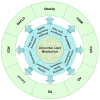Mechanisms of Abnormal Lipid Metabolism in the Pathogenesis of Disease
- PMID: 39126035
- PMCID: PMC11312913
- DOI: 10.3390/ijms25158465
Mechanisms of Abnormal Lipid Metabolism in the Pathogenesis of Disease
Abstract
Lipid metabolism is a critical component in preserving homeostasis and health, and lipids are significant chemicals involved in energy metabolism in living things. With the growing interest in lipid metabolism in recent years, an increasing number of studies have demonstrated the close relationship between abnormalities in lipid metabolism and the development of numerous human diseases, including cancer, cardiovascular, neurological, and endocrine system diseases. Thus, understanding how aberrant lipid metabolism contributes to the development of related diseases and how it works offers a theoretical foundation for treating and preventing related human diseases as well as new avenues for the targeted treatment of related diseases. Therefore, we discuss the processes of aberrant lipid metabolism in various human diseases in this review, including diseases of the cardiovascular system, neurodegenerative diseases, endocrine system diseases (such as obesity and type 2 diabetes mellitus), and other diseases including cancer.
Keywords: abnormal lipid metabolism; cancer; cardiovascular system diseases; endocrine system diseases; neurodegenerative diseases.
Conflict of interest statement
The authors declare no conflict of interest.
Figures
Similar articles
-
Advances in Understanding of the Role of Lipid Metabolism in Aging.Cells. 2021 Apr 13;10(4):880. doi: 10.3390/cells10040880. Cells. 2021. PMID: 33924316 Free PMC article. Review.
-
Inflammatory mechanisms linking obesity and metabolic disease.J Clin Invest. 2017 Jan 3;127(1):1-4. doi: 10.1172/JCI92035. Epub 2017 Jan 3. J Clin Invest. 2017. PMID: 28045402 Free PMC article. Review.
-
Estrogen receptors and endocrine diseases: lessons from estrogen receptor knockout mice.Curr Opin Pharmacol. 2001 Dec;1(6):613-9. doi: 10.1016/s1471-4892(01)00105-9. Curr Opin Pharmacol. 2001. PMID: 11757817 Review.
-
Organokines in disease.Adv Clin Chem. 2020;94:261-321. doi: 10.1016/bs.acc.2019.07.012. Epub 2019 Aug 12. Adv Clin Chem. 2020. PMID: 31952573 Review.
-
Roles of peptidyl-prolyl isomerase Pin1 in disease pathogenesis.Theranostics. 2021 Jan 19;11(7):3348-3358. doi: 10.7150/thno.45889. eCollection 2021. Theranostics. 2021. PMID: 33537091 Free PMC article. Review.
References
Publication types
MeSH terms
Grants and funding
LinkOut - more resources
Full Text Sources
Medical



